
Published: October 2025
Choosing the right business bank account is one of the most important financial decisions you'll make as a small or medium business owner in Australia. With the Big Four banks, modern fintechs, and digital-first platforms all competing for your business, the options can feel overwhelming. This guide breaks down what matters most and compares the leading providers to help you make an informed choice.
A business bank account is designed specifically for companies to manage their financial transactions. It allows you to deposit and withdraw funds, pay bills, receive customer payments, and keep your business finances separate from personal accounts. This separation is essential for accurate bookkeeping, tax compliance, and maintaining a professional image.
For companies, partnerships, and trusts in Australia, having a dedicated business account is a legal requirement. Even sole traders benefit significantly from keeping business transactions separate.
The business banking landscape has evolved dramatically. Between 2019 and 2023, banking interactions grew by 37%, driven by businesses demanding more digital capabilities and flexibility. Your choice of business account can impact everything from daily cash flow management to international growth opportunities.
Traditional banks offer stability and in-person service. Fintech providers deliver speed, lower fees, and innovative features. Understanding these differences helps you select an account that supports your business goals rather than holding them back.
Every dollar counts when you're building a business. Look for accounts with minimal monthly fees or conditions that waive fees entirely. Some providers charge $10 per month, while others offer fee-free accounts if you maintain a minimum balance or transaction volume.
Pay attention to the fine print on transaction fees. Electronic transactions are typically free, but over-the-counter deposits, cheques, and assisted transactions can cost $2.50 to $5 each. If your business handles cash regularly or requires branch support, these fees add up quickly.
For businesses dealing with international suppliers or customers, foreign exchange fees typically range from 0.5% to 3.5% of the transaction value. Traditional banks usually charge higher margins, while fintech providers offer more competitive rates.
If you operate internationally, holding multiple currencies without forced conversions saves significant money. This feature lets you receive payments in foreign currencies and convert them only when exchange rates are favourable.
Seamless connections with platforms like Xero, MYOB, and QuickBooks eliminate manual data entry and reduce errors. Most modern business accounts offer these integrations, but confirm compatibility with your specific tools.
Some providers include built-in payment processing for accepting customer payments online or in-person. This consolidates your financial tools and simplifies reconciliation.
We've evaluated the leading options across traditional banks and fintech providers. Here's what each offers Australian SMEs.
CommBank remains the largest bank by customer base in Australia and offers a well-rounded business account suitable for everyday operations.
Key Features:
Considerations: International transactions carry a 3.5% fee, which is higher than many competitors. Assisted transactions beyond your monthly allowance cost $5 each. The account works best for businesses primarily operating domestically with minimal branch service needs.
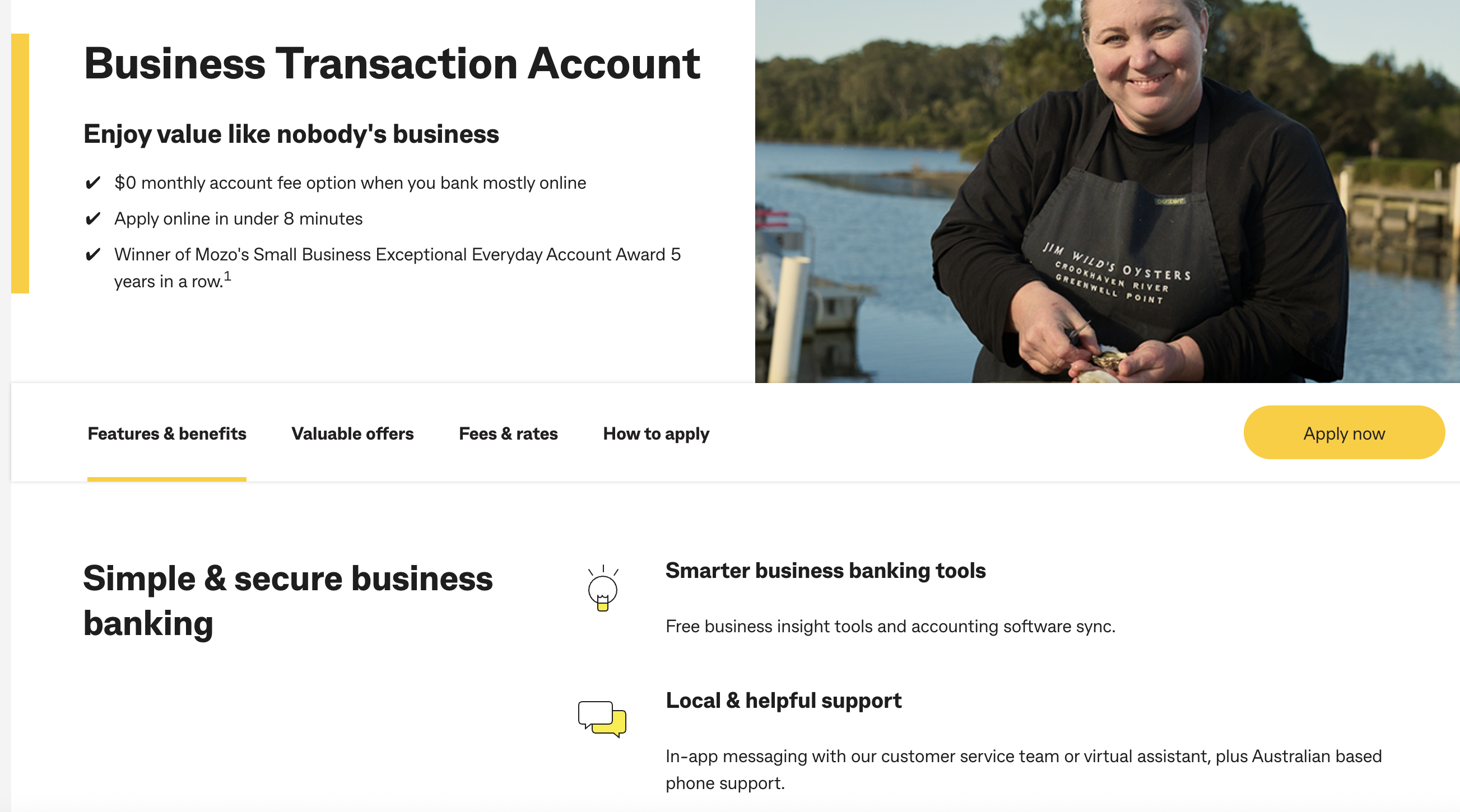
National Australia Bank targets small businesses with straightforward banking needs and strong digital tools.
Key Features:
Considerations: Banker-assisted transactions cost $3 each, with an additional $3 fee for express deposits and cheques. International transactions carry a 3% fee plus a $5 overseas ATM withdrawal charge. Like CommBank, it's designed for predominantly domestic operations.
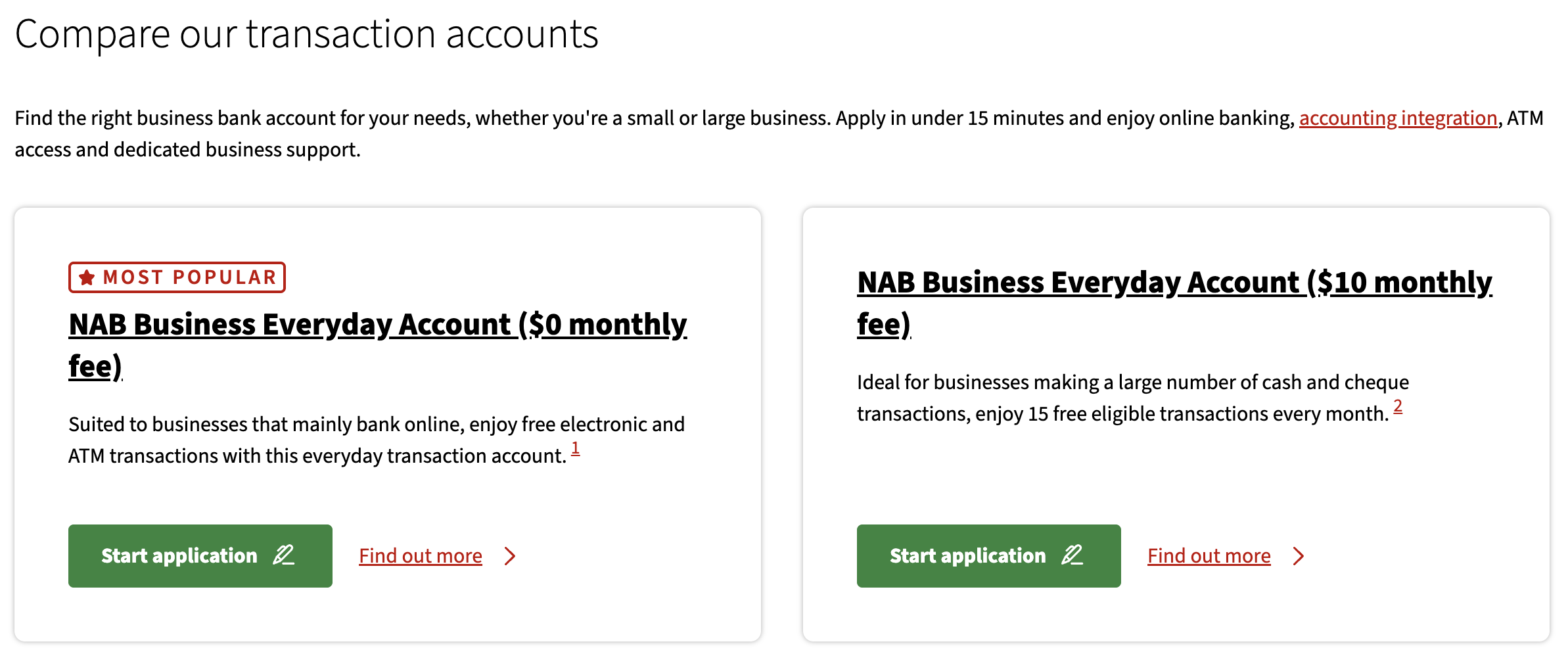
Established since 1828, ANZ provides extensive banking services to over 8.5 million customers across the region.
Key Features:
Considerations: The account charges 3% on overseas transactions and $5 for international ATM withdrawals. The $10 monthly fee applies regardless of account activity. Best suited for businesses that value extensive branch networks and traditional banking relationships.
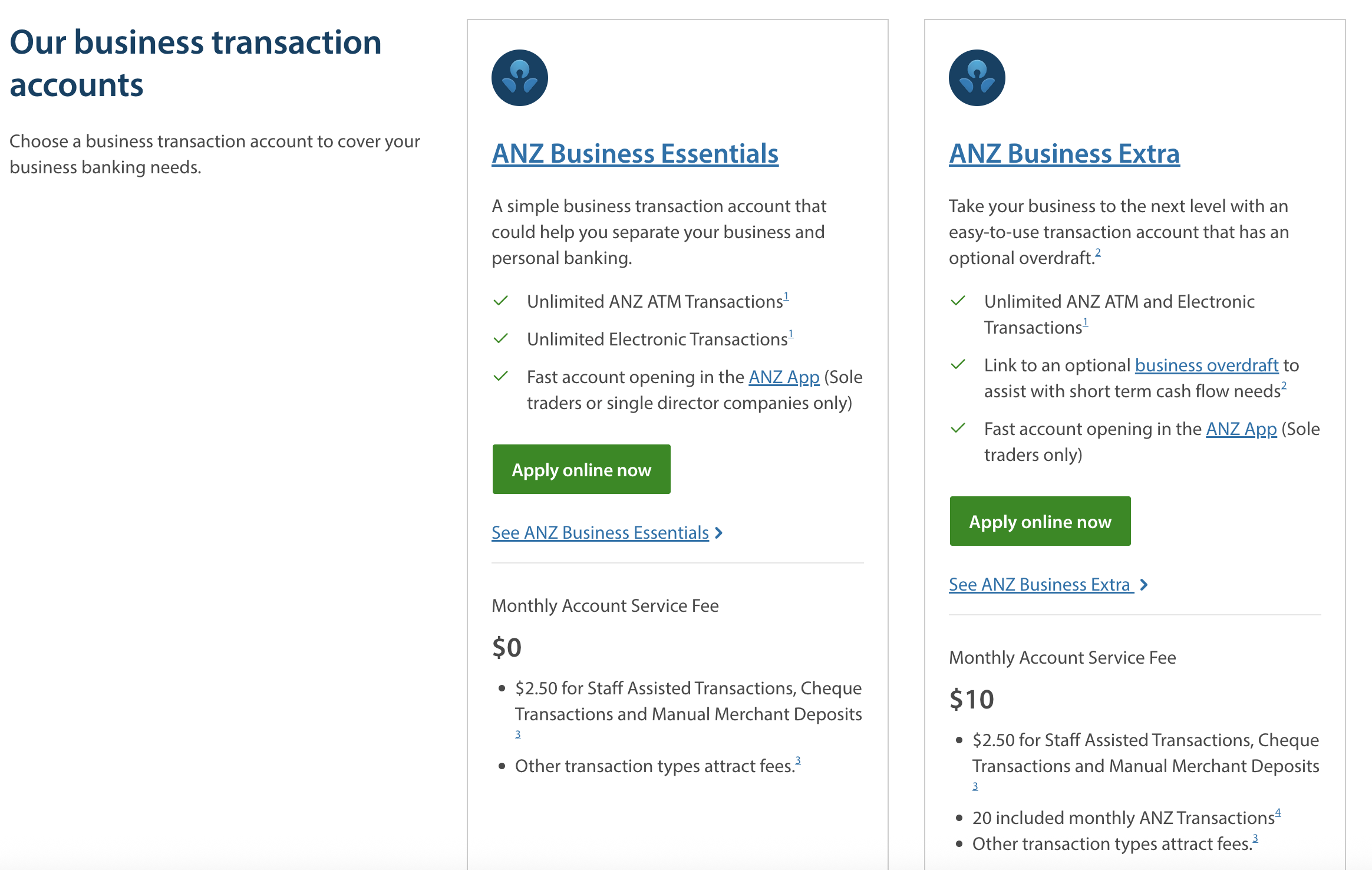
As Australia's oldest bank, Westpac emphasises trust and competitive offerings for businesses with lower transaction volumes.
Key Features:
Considerations: Staff-assisted transactions cost $3 each. The account earns no interest on balances and only supports AUD. If you accidentally overdraw, you'll face a 15.01% unarranged lending rate. Best for digitally-savvy businesses operating primarily in Australia.
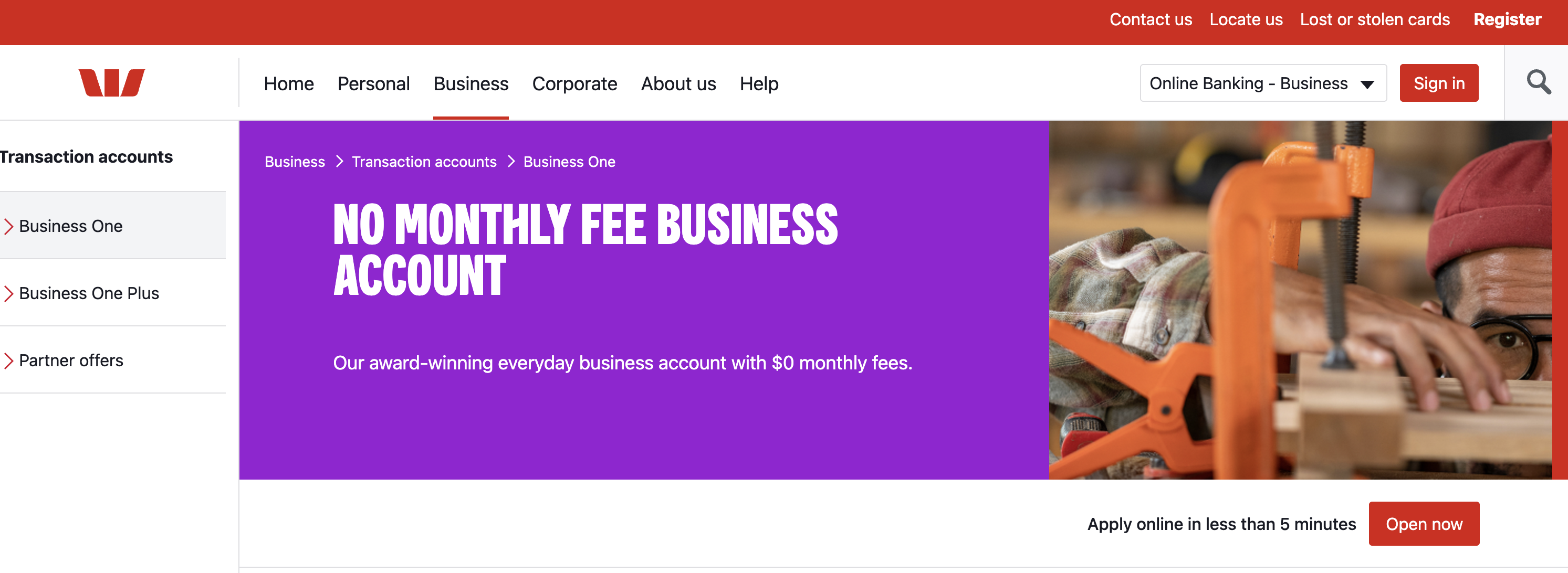
Airwallex operates as a fintech rather than a traditional bank, focusing on technology-led financial solutions for growing businesses.
Key Features:
Considerations: Foreign exchange margins range from 0.5% above interbank rates for major currencies to 1% for other currencies. Physical cards carry a one-off fee, and SWIFT transfers cost $10-$30. No physical branches available. Designed specifically for businesses with international operations or growth ambitions.
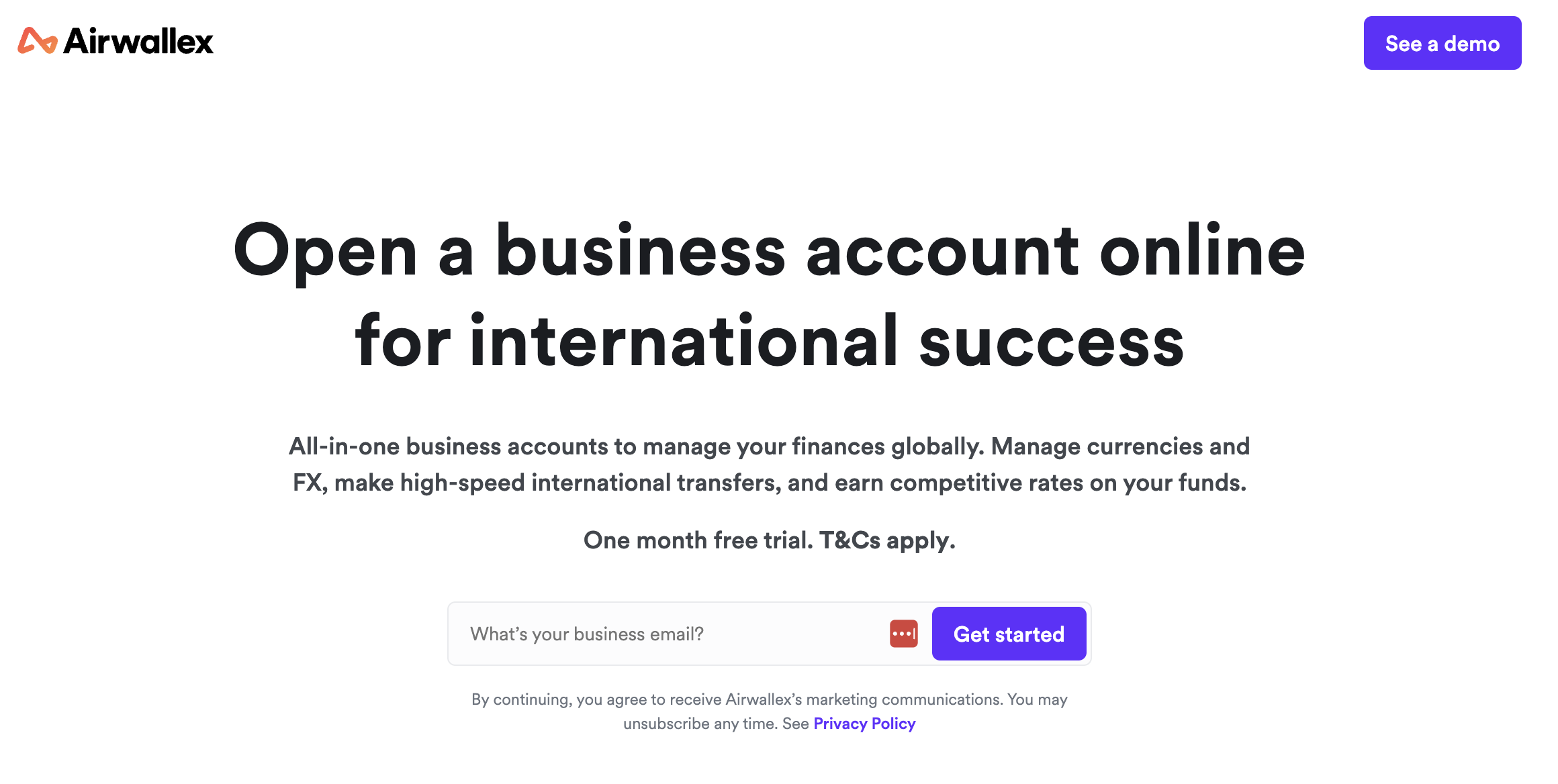
Wise has built its reputation on transparent, low-cost international money transfers and now offers comprehensive business banking.
Key Features:
Considerations:Transaction fees apply when sending payments or converting currencies. No physical branches or in-person support. The upfront fee may deter some businesses, but the long-term savings on international transactions often justify the cost. Ideal for freelancers, ecommerce businesses, and companies with international clients.
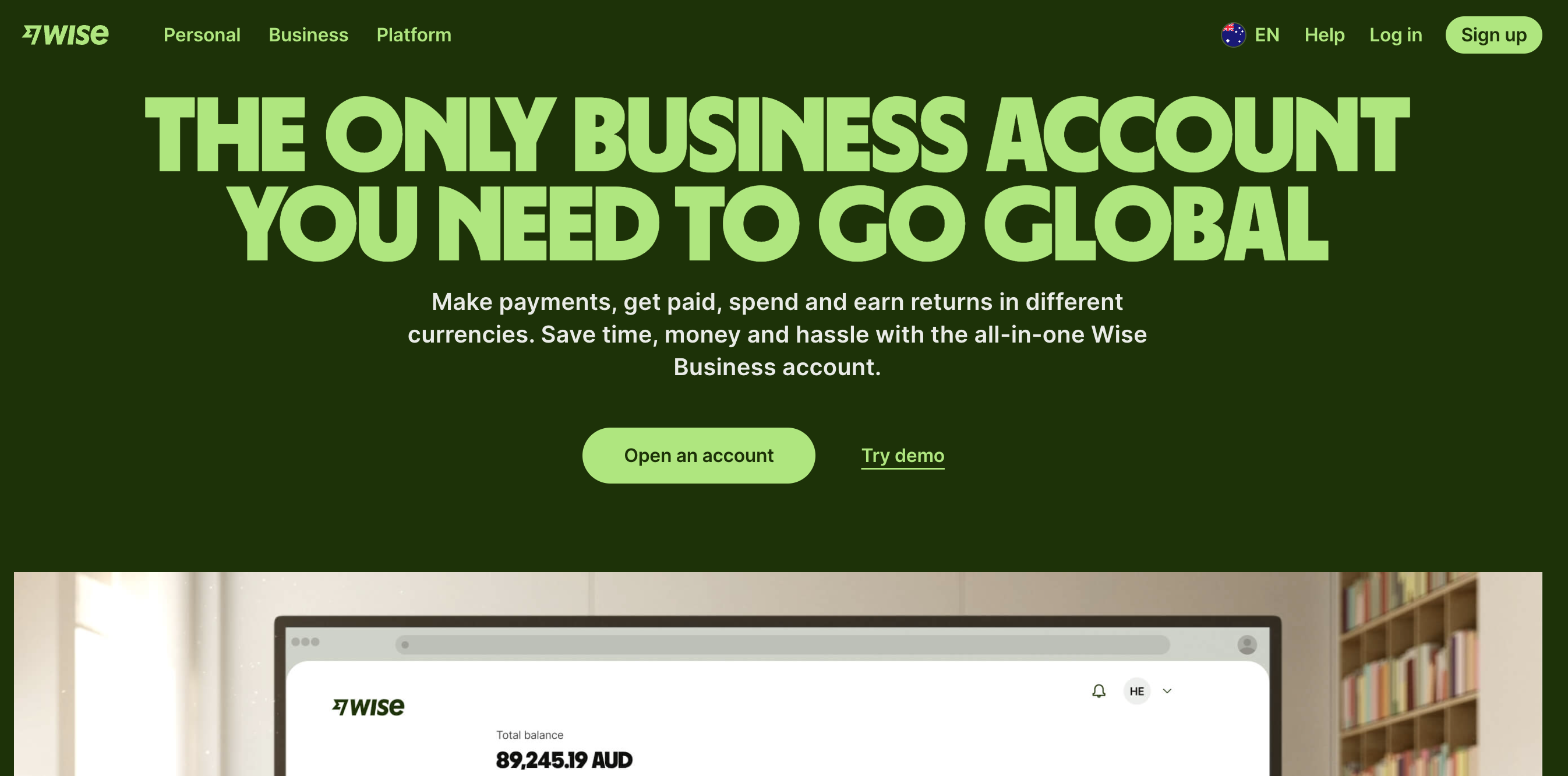
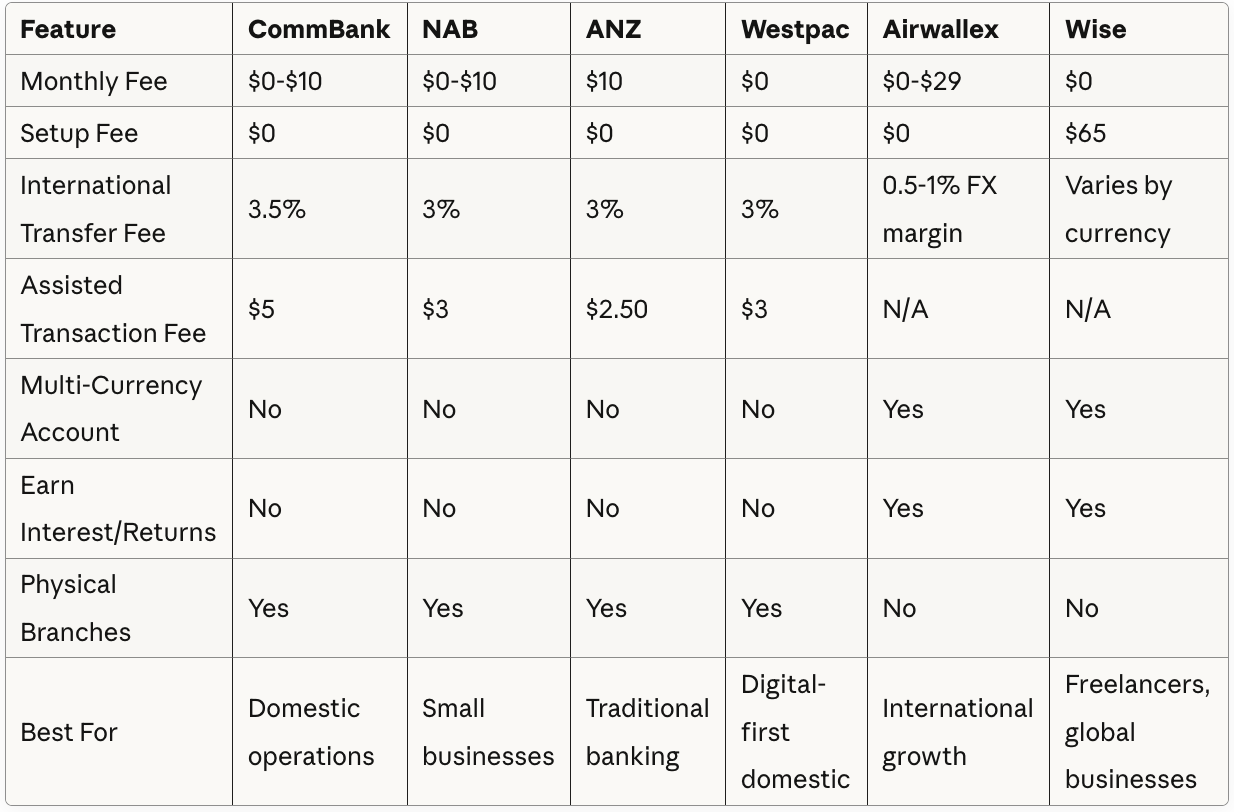
Disclaimer: Rates and fees are current as of October 2025 but are subject to change. All fees are quoted in AUD. Always verify current pricing directly with providers before making a decision.
For most Australian SMEs, fintech providers offer compelling advantages over traditional banks:
No Branch Visits Required: Open your account entirely online in minutes, not days. Upload documents digitally and receive approval without setting foot in a bank branch or waiting for business banking hours.
Zero Paperwork: Forget printing, signing, and mailing forms. Fintech applications are streamlined, mobile-friendly, and designed for busy business owners who need to get up and running quickly.
Less Friction, More Speed: Traditional banks often require multiple appointments, relationship managers, and lengthy approval processes. Fintech providers remove these barriers with automated verification and instant account access.
Modern Features Built In: Multi-currency accounts, real-time notifications, expense management, and accounting integrations come standard. These aren't add-ons or premium features, they're the baseline.
Lower Fees: Without the overhead of branch networks and legacy systems, fintech providers pass savings directly to you through reduced or eliminated monthly fees and competitive FX rates.
Traditional banks remain relevant for specific situations:
Many successful Australian SMEs use a hybrid model: a fintech account as their primary operating account for speed, efficiency, and lower costs, supplemented by a traditional bank relationship for specific needs like lending or cash handling. This approach maximises flexibility whilst minimising unnecessary fees and friction.
Opening a business account is straightforward, but requirements vary by provider and business structure.
For All Business Types:
For Companies:
For Sole Traders:
Most providers now offer fully digital applications. You'll typically complete an online form, upload required documents, and wait for verification. This process can take anywhere from a few minutes to several business days, depending on the provider and your business structure.
Traditional banks may require an in-person visit for certain business types or larger enterprises. Fintech providers generally complete everything digitally, expediting the process significantly.
The best business account for your operation depends on several factors:
Consider Your Business Model:
Evaluate Your Transaction Patterns:
Think About Your Growth Plans:
Yes, if you operate as a company, partnership, or trust, a separate business bank account is mandatory. Sole traders can technically use personal accounts, but maintaining separate business accounts simplifies tax compliance, improves bookkeeping accuracy, and presents a more professional image to clients and suppliers.
The best choice depends on your specific needs. Traditional banks like CommBank and NAB suit businesses requiring branch access and cash handling. Fintech providers like Airwallex and Wise excel for international operations and digital-first businesses. Evaluate your transaction patterns, growth plans, and feature requirements before deciding.
Costs vary significantly. Some accounts like Westpac Business One charge no monthly fees, while others charge $10-$29 monthly. Transaction fees, international transfer costs, and additional services impact total expenses. Digital-only accounts typically cost less than those requiring branch support. Always calculate total costs based on your expected usage patterns.
Yes, many businesses maintain multiple accounts for different purposes. You might use one for everyday transactions, another for savings, and a fintech account for international payments. This strategy can optimise fees, separate revenue streams, and improve financial management. Ensure you can manage multiple accounts efficiently before opening them.
Business accounts offer features specifically designed for companies: multiple user access, integration with accounting software, higher transaction limits, payment processing capabilities, and detailed financial reporting. They also legally separate business and personal finances, which is essential for tax purposes and liability protection.
Digital applications with fintech providers can be approved within minutes to a few days. Traditional banks may take several business days to a week, particularly for complex business structures. Companies and trusts typically require more verification time than sole traders. Having all documentation ready accelerates the process.
Traditional banks typically don't offer interest on standard business transaction accounts. Some fintech providers like Airwallex and Wise provide returns on balances held in specific currencies. If earning interest matters to your business, compare offerings carefully or consider a separate business savings account.
Yes, switching is generally straightforward but requires planning. You'll need to update payment details with clients and suppliers, redirect direct debits, and transfer recurring payments. Many banks offer switching services to assist. Maintain your old account briefly during the transition to ensure no payments are missed.
Scale Suite helps Australian small and medium businesses streamline their financial operations and scale efficiently. We provide comprehensive solutions for business banking, payment processing, and financial management tailored to the unique needs of growing Australian companies.
Whether you're launching your first venture or expanding an established business, Scale Suite delivers the tools and expertise to manage your finances effectively. Visit www.scalesuite.com.au to learn how we can support your business growth.
For more resources on managing your business finances, explore our comprehensive guides at www.scalesuite.com.au/resources.
Scale Suite delivers embedded finance and human resource services for ambitious Australian businesses.Our Sydney-based team integrates with your daily operations through a shared platform, working like part of your internal staff but with senior-level expertise. From complete bookkeeping to strategic CFO insights, we deliver better outcomes than a single hire - without the recruitment risk, training time, or full-time salary commitment.
Considering building an internal finance team?
We'll show you exactly what our three-tier model covers, how it compares to internal hires, and what it would cost for your business.
We'll reply within 24 hours to book your free 30-minute call.
No lock-in contracts and 30-day money-back guarantee.



